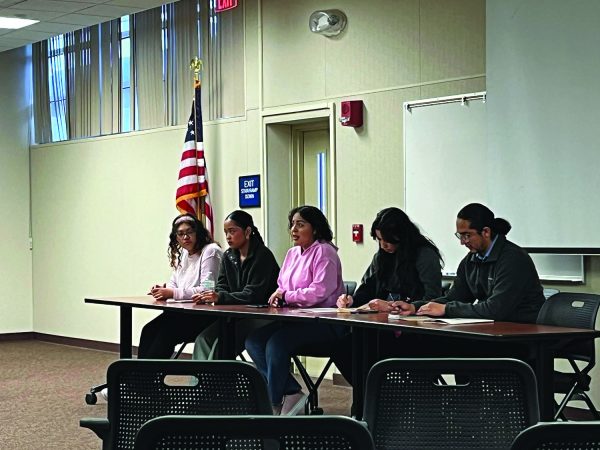Public Health Office teams up with spiritual leader to talk safe sex
November 28, 2017
While being the eleventh most populous county in California, Kern is currently competing with its larger neighbors for the position of having the highest rates of sexually transmitted diseases in the state. The less-than-prestigious title is currently held by San Francisco County, but with a 40 percent increase in reported STDs over the past 5 years, Kern is swiftly catching up. Because of these troubling rates, the Kern County Department of Public Health (KCDPH) implemented the “Know Your Risk” campaign, which aims to spread awareness and information on sexual health issues to Kern County residents by partnering with community organizations – some of which are faith-based.
A 2016 California Department of Public Health report found that one out of every four sexually active teen girls in Kern County has an STD. Kern County ranked fourth highest in cases of Gonorrhea and Primary and Secondary Syphilis, while ranking second highest in Chlamydia. The county also exceeds state averages for Congenital Syphilis, a form of Syphilis that is passed from mother to child during pregnancy, by 344 percent.
Schools in California are not required to offer comprehensive sexual education, although, according to the California Department of Education, more than 96 percent do. Parents must sign a permission slip allowing their children to participate in these programs. Opting out is always an option, and one that some parents in Kern have taken advantage of.
Nearly 50 percent of the residents in Bakersfield, Kern County’s most populate city, identify as religious. The city has a strong Roman Catholic base, with more than 30 percent of residents self-identifying as such, and 14.9 percent identifying as Baptist, Lutheran, Methodist, Pentecostal, Presbyterian, or Other Christian. Out of 500,173 eligible voters, 65 percent of the population is registered to do so and the majority of registered voters are Republicans.
In the wake of such a dramatic and dangerous increase in STD rates among residents of a mostly conservative county, the KCDPH was tasked with the mission of finding a solution to the alarming, yet preventable problem.
“Our leadership team came to the realization that Public Health must do more to address this escalating health crisis,” said Michelle Corson, a spokesperson for KCDPH. “With internal brain-storming sessions, meetings with community agencies, and thinking outside the box, we launched a multi-year action plan in early 2016 called ‘Know Your Risk,’” said Corson
The “Know Your Risk” campaign is one in which the KCDPH extended offers to local businesses and organizations to partner with them in providing county residents with greater access to sexual education.
“We asked our community for help, including parents, educators, medical providers, media, non-profits, and the faith-based community,” said Corson.
The first to accept the invitation was Pastor Eric Simpson of the Bridge Bible Church. KCDPH staff joined Simpson at his church in giving a presentation on ways in which parents should discuss sexual health issues with their children. Video of the presentation, which included a sermon from Pastor Simpson along with an overview on STDs and methods of protection that was given by health department staff, was taken and edited into a series titled “Talk With Your Kids About Sex: A Faith Based Approach,” which was featured on the KCDPH website, YouTube channel, and Twitter account. The KCDPH also purchased billboards that feature the pastor ‘s image promoting the “Know Your Risk” campaign.
“The ultimate goal is to empower parents to have these conversations with their children,” said Corson, “The partnership with Pastor Eric was just one way to encourage these actions within families. Wouldn’t it be fantastic if all of our faith based groups were educating themselves on our STD health crisis, and encouraging parents to hold these important discussions with their children?”
The Faith Based Approach section on the KCDPH’s website does not solely advocate for abstinence, nor do the sermons given by Simpson. The website provides a complete list of various STDs, and information about various methods of protection. It also provides charts and graphs showing Kern County’s rapidly increasing STD rates. The website links to the series of videos which contain a number of biblical quotes from the book of Proverbs.
Despite the faith-based approach portion of the website being medically accurate and not focused on an abstinence-only protection method, some Bakersfield residents find the campaign unacceptable due to the close proximity in which a tax-dollar funded county organization is working with a religious institution.
“Faith based means marginalization of people who aren’t of the faith being promoted here,” said local businessman, Seven Bates. “If they’re already going to have a program that introduces all of these health department necessities, why muck it up by promoting a faith based approach… It doesn’t matter that they forced a faith-based organization to actually adhere to proper principles. It’s still a violation of the Establishment Clause.” said Bates.
Bates’ statement isn’t inaccurate. According to the decision of the 1947 Supreme Court case of Everson v. Board of Education, the Establishment Clause – which, along with preventing the government from making any law respecting a religion, also forbids government actions that unduly favor one religion over another – not only applies to the federal government, but to the states, as well. With the KCDPH being a county department, the legality of the department’s promoting of a faith-based alternative to Sex Ed that specifically lends a nod to Christianity is murky, at best.
“Our invitation went out to all faith-based organizations. No other group has accepted our invitation yet, but we hope to see more partnerships in the future with faith-based groups,” said Corson.
Thus far, STD rates in Kern County have increased since the Know Your Risk campaign’s start in 2016, but Corson is hopeful that the county will see improvements in the future. “… increased awareness can certainly increase people seeking services and getting tested. We embarked on a multi-year approach and expect that it may take some time to turn our high rates around.”












